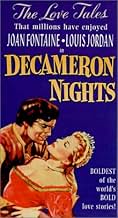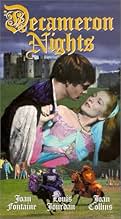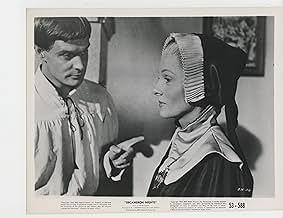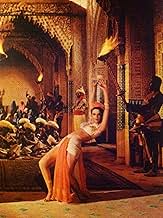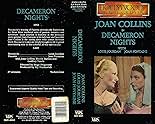Ajouter une intrigue dans votre langueThe main story combines bits of Giovanni Boccaccio's own life (maybe and maybe not) with three of his most fabulous stories of love. It has Boccaccio following Fiametta to a country villa wh... Tout lireThe main story combines bits of Giovanni Boccaccio's own life (maybe and maybe not) with three of his most fabulous stories of love. It has Boccaccio following Fiametta to a country villa where she and five other women---The Contessa, Pampinea and three villa girls are hiding fol... Tout lireThe main story combines bits of Giovanni Boccaccio's own life (maybe and maybe not) with three of his most fabulous stories of love. It has Boccaccio following Fiametta to a country villa where she and five other women---The Contessa, Pampinea and three villa girls are hiding following the rape of their home city, Florance, Italy, by the Duke of Lorenzo. The recently-... Tout lire
- Réalisation
- Scénario
- Casting principal
Avis à la une
Let's say it: Fregonese's Decameron is at least as good,as entertaining ,nay more elegant and subtler than that of his Italian colleague.Everything is suggested ,full of (more or less)veiled innuendos and it works quite well:three segments based on three tales told by the writer or Flamette;and what a good idea to have the actors play the "real" plot and the fictions !Joan Fontaine ,for instance ,is cast against type as a ship's boy and later an oriental one ,complete with turban and she manages quite well ,in this Virginia Mayo style.French Louis Jourdan ,who is still living ,is ideally cast as the handsome lady killer:and what a pleasure to hear him say in his first language "Bon Voyage" or "rendezvous"!;the cinematography is splendid and the screenplay is remarkably constructed.
"Decameron Nights" is just the opposite - it's a romantic romp with humor. There are three stories about the couple and the audience is made to guess which story is true about how they met. Both Ms. Fontaine and Mr. Jourdan made few comedies. This is their best. Both serious actors are funny. It is fun to see a young Joan Collins in a supporting role. Binnie Barnes and Godfrey Tearle are a superb supporting cast. Ms. Barnes was given a rare chance to shine in a movie.
Renaissance Italy has not been the subject of that many films in American and England. The Borgias are covered in "Prince of Foxes" and "Bride of Vengeance". Savanerola's attempt to reform Florence appears in the silent classic "Romola". Michaelangelo and Pope Julius II are dealt with in "The Agony and the Ecstasy". The German invasions of the 13th Century are covered in "The Flame and The Arrow". St. Francis of Assisi and Pope Innocent III are covered (sort of for the Pope) in "Brother Sun, Sister Moon". Those six films and this one seem to be it. No doubt more Italian made movies dealt with the figures of the Renaissance, but for some reason they never attracted American and English audiences. It seems to be our loss.
Because some of the stories are bawdy, the 1953 film does NOT have all 10 of the stories...only three. Additionally, they were heavily sanitized to suit the times when the film was made. After all, the USA (a huge film market) had the Production Code...meaning the original stories NEVER could have been filmed as they were written!
When the film begins, Boccaccio (Louis Jourdan) arrives in Florence which is filled with nasty soldiers who are sacking the town. He's there to see a woman he loves, Fiametta (Joan Fontaine), a widow who does NOT want to see him!
To amuse Fiametta and her friends, he tells a tale about a man who steals an old man's wife and holds her captive. There really isn't a good moral to the story and Fiametta responds by telling a tale about chastity and a woman with a birthmark. Boccaccio counters with a tale which, once again, is about infidelity.
At this point, Fiametta is angry with Boccaccio and the film ends, of course, with Boccaccio winning her heart despite her protestations.
As far as the film goes, the stories are pretty interesting BUT are done in a very dull and pedestrian manner. Although the film is in color, it lacks 'color' and the performances are surprisingly restrained. Overall, a skippable movie.
The first is "Paganino the Pirate", a spicy tale of a young wife, Bartolomea (Joan Fontaine)who, married to an elderly gent, Ricciardo (Godfrey Tearle), who prefers astrology to martial bliss, permits herself to be captured by a young pirate, Paganino (Louis Jourdan), to teach her husband a lesson. Binnie Barnes is the Countess of Florence and Elliott Makeham the Governor of Majorca in this segment.
The second tale is "Wager on Virtue", concerning an elderly merchant, Bernado (Godfrey Tearle),who loses faith in his beautiful young wife, Ginevera (Joan Fontaine), on the strength of circumstantial evidence present him by a daring young rogue, Guilio (Louis Jourdan), who has previously goaded him into a bet on his wife's virtue, or lack thereof. The characters in this segment include Nerina (Binnie Barnes), The Sultan (Meinhart Maur), the Merchant Captain (Van Boolen), a Merchant in French Inn (Gordon Bell) and George and Bert Bernard as messengers.
The third story, told by Fiametta, is "The Doctor's Daughter," concerning a delicate matter of matrimony when a wife, Isabella (Joan Fontaine), finds herself spurned by the man, Bertrando (Louis Jourdan), who has wed her at the command of his King (Hugh Morton.) Characters include Maria (Joan Collins), The Old Witch (Binnie Barnes), Father Francaisco (Noel Purcell) and Signora Bucca (Marjorie Rhodes.)
The three stories bring the main story back to a happy and logical conclusion.
Le saviez-vous
- AnecdotesSir Peter Ustinov was originally to co- star, and also apparently contributed to the script.
- GaffesAs Boccaccio surveys the shore from his 14th century ship, a large white truck is visible on a road.
- Citations
Fiammetta: But is there no way to keep you with me?
Giovanni Boccaccio: Do you see this ring? When you wear this, and you bear me a child - then, and only then - will I become your husband in every sense of the contract.
Fiammetta: But how can I wear your ring if you won't give it to me? And how can I give you a child if you - don't stay with me?
Giovanni Boccaccio: You look like a resourceful woman.
Meilleurs choix
Détails
- Date de sortie
- Pays d’origine
- Site officiel
- Langue
- Aussi connu sous le nom de
- Decameron Nights
- Lieux de tournage
- Sociétés de production
- Voir plus de crédits d'entreprise sur IMDbPro
- Durée1 heure 33 minutes
- Rapport de forme
- 1.37 : 1
Contribuer à cette page



